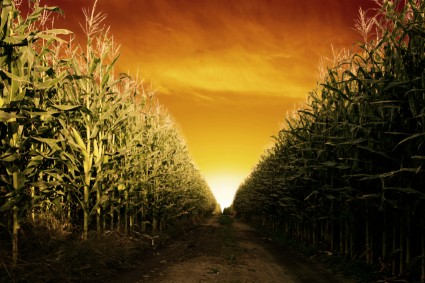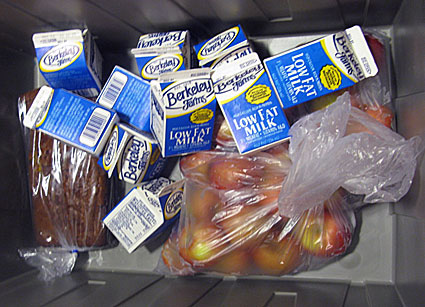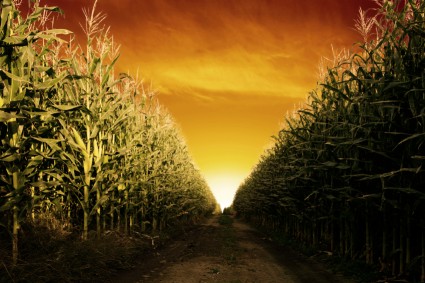 Thus far the majority of analysis of the Kerry-Lieberman climate bill has focused on the energy components of the bill, including an extension of nuclear power, “clean coal” from carbon storage and sequestration, and offshore drilling expansion. The bill also provides unprecedented programs for agriculture and food systems in the U.S. and internationally. Unfortunately, while the bill contains strong language promoting sustainable agriculture, it also offers support for troubling agricultural practices that have yet to significantly prove their capacity to reduce emissions.
Thus far the majority of analysis of the Kerry-Lieberman climate bill has focused on the energy components of the bill, including an extension of nuclear power, “clean coal” from carbon storage and sequestration, and offshore drilling expansion. The bill also provides unprecedented programs for agriculture and food systems in the U.S. and internationally. Unfortunately, while the bill contains strong language promoting sustainable agriculture, it also offers support for troubling agricultural practices that have yet to significantly prove their capacity to reduce emissions.
I was at a meeting recently where someone said, “Agriculture is a culprit, a victim, and a solution,” which poignantly encapsulated the challenges and promise of agriculture in the future. Agriculture is responsible for problematic emissions — particularly methane and nitrous oxide, which are generated by manures, livestock, and soil management, including nitrogen additions, and are considerably more potent than carbon dioxide. Agriculture stands to be greatly affected by climate change, from crop ranges to yields and water allocation. Yet farmers can do more than minimize their impact.
So, what does this climate bill ultimately mean for farmers, for the role of agriculture in the climate debate, and ultimately for reducing greenhouse gas (GHG) emissions?
First and foremost, the K-L bill follows in the footsteps of the Waxman-Markey legislation, passed last summer, by establishing an agricultural and forestry offsets program. Last year, the Environmental Protection Agency predicted that such a program could provide annual net benefits to farmers as high as $18 billion — an amount that could fundamentally change the way America farms. Yet, while these benefits are attractive, achieving true GHG reductions must mean that legislation is incentivizing effective and real practices.
Under the K-L bill, the offsets program is run under the USDA with significant input from an advisory committee that could be made up of academics, business representatives, NGOs, and government officials. Though the projects that will be eligible for the offsets program are not officially set in stone, the bill does outline a “minimum number of practices” which must be considered for inclusion by the advisory committee. The list of practices is largely similar to the one revealed in the Waxman-Markey bill last year after House Agriculture Committee Chairman Colin Peterson added a 50-plus page markup to the bill. The full list of “potential practices” is a diverse array, including altered tillage, cover cropping, nitrogen fertilization efficiency, farming methods used on certified organic farms, pasture-based livestock systems, reductions in animal management emissions, rotational grazing, crop rotations, and methods for increasing carbon sequestration in soils.
One notable difference, absent from the Waxman-Markey bill and other earlier versions of the Senate bill, is the inclusion of certified organic agriculture practices. A variety of research has found organic agricultural practices can increase carbon storage and decrease fossil fuel energy requirements and GHG emissions.
The K-L bill also goes one step further than just a carbon offset program. It establishes a “Carbon Conservation Program” designed to encourage GHG reductions and sequestration activities for landowners and others with grazing contracts not eligible for the offset program. The CCP does what a lot of farmers wanted: it provides a way to reward the early adopters of beneficial practices. It will provide incentives for farmers already practicing organic practices — or cover cropping or reduced tillage — to continue to do so. This is vital, but also has the potential to backfire if the practices being rewarded are not actually providing climate change benefits.
The bill’s list includes several practices that have questionable benefits to the climate and that could create additional environmental problems. Featured prominently is no-till agriculture, which is widely associated with Roundup-Ready genetically modified crops and often accompanied by increased herbicide use to control weeds in lieu of tilling. Biofuels are also weighted heavily in the bill, even though certain kinds have been shown not to reduce greenhouse gases. The inclusion of composting in the bill ought to be positive, but “compost” can sometimes be a cover word for chemical-laden sewage sludge.
Close board oversight and quality methodologies will be crucial to verifying that any practices promoted by an offset program actually have the science to back up their measurable net reductions in GHG emissions. If a practice such as no-till agriculture reduces carbon dioxide emissions by limiting the number of tractor passes on a field, but simultaneously increases emissions of nitrous oxide — a greenhouse gas 300 times as strong as carbon dioxide — and use of herbicides, the overall benefit to the climate could be nil or worse. Technical assistance and outreach for farmers and landowners will also be incredibly important, but thus far, little research exists to understand the types of farms and farmers willing and able to participate in offset initiatives.
A climate bill that establishes a carbon offset program in agriculture and forestry is only going to be effective if those offsets are legitimate and if they are accompanied by strong efforts in other sectors. Unfortunately, the offshore drilling, expansion of carbon sequestration and storage practices, and nuclear power touted in the K-L bill not only have questionable benefits for reducing GHG emissions, but carry serious environmental risks such as has been clearly demonstrated by the Gulf of Mexico oil spill. Agriculture can and should be part of the solution by reducing its own emissions and sequestering carbon with proven techniques, but it’s not the only solution, and it cannot stand alone in a climate bill that falls so short of true environmental progress.



